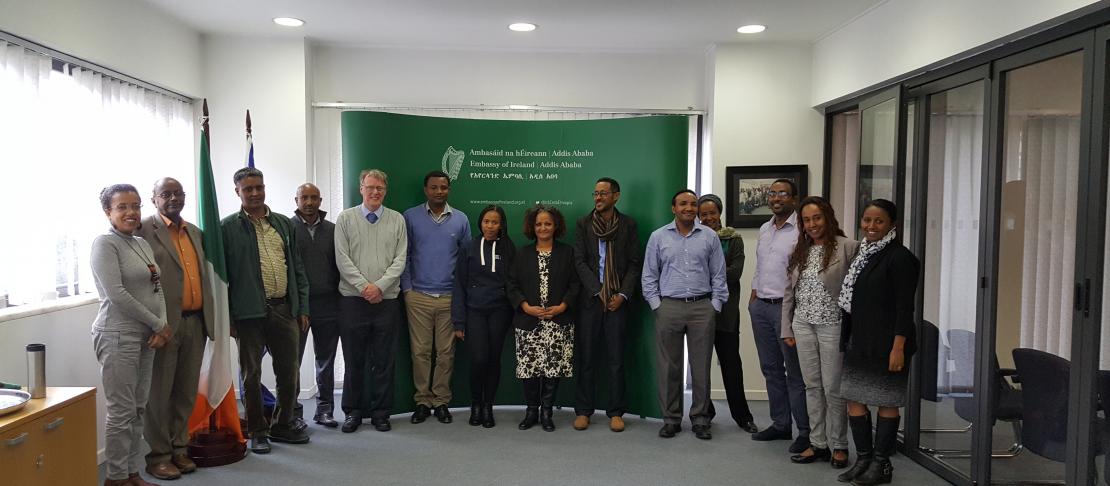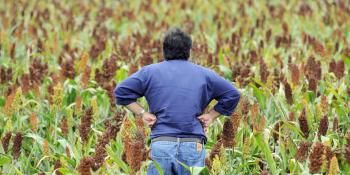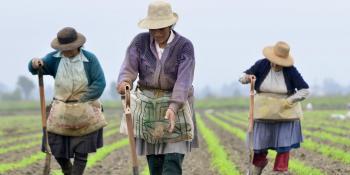CCAFS and Irish partners committed to training the next generation of climate change, agriculture and food security researchers

CCAFS is building the capacity of future researchers by offering practical training grounds for climate-smart agriculture research and innovation.
To tackle the challenges smallholder farmers are facing under a changing climate, the CGIAR Research Program on Climate Change, Agriculture and Food Security (CCAFS) works as a global strategic partnership between the world's leading research institutions on agriculture, climate change, and food security. The Program works with a wide range of partner institutions in government, civil society, the private sector, and academia.
Our strategic research partners create significant new avenues for interaction and synergies
Our strategic research partners create significant new avenues for interaction and synergies. For example, CCAFS is a partner in the award-winning MSc program on Climate Change, Agriculture and Food Security (MScCCAFS) at the National University of Ireland Galway (NUI Galway)—a university that ranks among the top 1% of universities in the world.
The MScCCAFS program is aimed at students who want to combine scientific, engineering, technical, and social or policy skills so that they are better equipped to understand and make significant contributions regarding the adaptation and mitigation of climate change impacts on global agriculture and food security. The program provides opportunities for students from developing countries to advance and refine their skills and tools for developing agricultural practices, policies and measures to address the challenge that global warming poses for agriculture and food security in their home countries and globally.
In 2017, a student from the MScCCAFS program spent three months working on a climate-smart agriculture (CSA) project with CCAFS and the International Livestock Research Institute (ILRI) in ILRI’s Feed and Forage program in Ethiopia. Supported by an Irish Aid Fellowship, the ILRI Feed and Forage program, and CCAFS’s Flagship on Priorities and Policies for CSA, Ms. Kelebogile Kekae, a NUI Galway student from South Africa, investigated the impact of climate change on forage grasses in Ethiopian livestock systems. Her research results have been important for identifying both the challenges and solutions for climate-proofing of livestock production systems in Ethiopia for the future.
Ms. Kekae was afforded an opportunity by Patrick McManus, Head of Development Cooperation (Irish Aid, Ethiopia), to give a presentation on her research work with CCAFS/ILRI at the Irish Embassy in Addis Ababa. Dr. Dawit Solomon, CCAFS East Africa Program Leader also provided a briefing to the Embassy and Irish Aid program staff about the ongoing CCAFS activities for development of climate-resilient agricultural systems in the region.
Great monthly Programme Team Meeting! We also had a presentation on climate Smart Agriculture by Dawit & kelebogile, Irish Aid fellowship. pic.twitter.com/6Gvd3aOVfH
— Irish Embassy Addis (@IrlEmbEthiopia) 2017. július 21.
These are great opportunities, on both sides—they give young people a taste of working in different research environments, at the same time making a real contribution to a real-world problem at the start of their career.”
Dr. Philip Thornton, CCAFS Flagship Leader, Priorities and Policies for CSA
CCAFS East Africa is aiming to further strengthen its collaboration with NUI Galway, coordinating its efforts with the University’s MScCCAFS program to receive additional students in the coming years, and helping to guide MScCCAFS students to focus on the regional priorities and projects highlighted under the various CCAFS flagship programs in East Africa.
As part of the initiative to expand the collaboration from Ethiopia to other East African countries, CCAFS East Africa is hosting Sean Kelly, a current MScCCAFS student, at the Nyando Climate-Smart Villages from May to July 2018. His research project with CCAFS East Africa will examine how formal and informal institutions influence the uptake of CSA technologies and practices. In addition, ILRI is hosting a second MScCCAFS student over the same period: Mercy Fakude, a crop scientist from South Africa, will be working with ILRI’s Feed and Forage program and CCAFS Flagship on Priorities and Policies for CSA on new methods of targeting climate-resilient feeds and forages in smallholder systems in Kenya.
To build the capacity of current and the next generation of researchers in agriculture, food security and climate change, CCAFS East Africa is currently exploring common areas of interest and opportunities for collaborative partnership with other national and international universities.
NUI Galway is proud to be a Strategic Research Partner for the CCAFS program and is committed to continue working closely with the CCAFS program on research and education activities that contribute to the urgently needed transformation towards climate-resilient agricultural and agrifood systems that can support improved human livelihoods.
The award-winning MScCCAFS program that NUI Galway has established with CCAFS has to date trained over 60 MScCCAFS graduates who are now deploying their inter-disciplinary skills across multiple institutions globally, where they are working on climate change adaptation, mitigation and sustainable development of agriculture and agrifood systems.”
Prof. Charles Spillane, Director of the MScCCAFS program at NUI Galway
Read more:
- Course information: MSc (Climate Change, Agriculture and Food Security)
- Website: Kelebogile Kekae
Charles Spillane is the Director of the MScCCAFS program, NUIG. Dawit Solomon is the CCAFS East Africa Regional Program Leader. Philip Thornton is the CCAFS Flagship Leader on Priorities and Policies for CSA. Catherine Mungai, Partnerships and Policy Specialist at CCAFS East Africa and Lili Szilagyi, Communications Consultant at CCAFS East Africa, also contributed.



